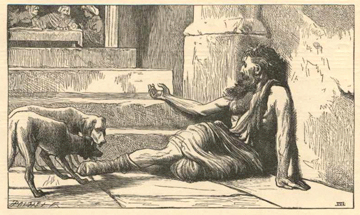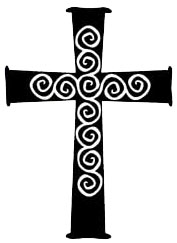|
The Rev. Frank
Logue You Can Take it with You Jesus retells a known story in today’s Gospel, but he did it with some minor changes, which made a big difference to the hearers. To understand what that might feel like, to be the surprised hearer, I want to share with you, “The Princess and the Pea” as retold in The Stinky Cheese Man and other Fairly Stupid Tales. [Read “The Princess and the Bowling Ball” from the Stinky Cheese Man.] You change a few details and the story ends in a very different way. This is a technique Jesus used a number of times in his teaching and the best example is the story we now know as “The Rich Man and Lazarus.” The New Testament scholar Joseph Fitzmeyer and others note that the parable of the rich man and Lazarus has several clear historical antecedents in the folklore of Egypt as well as the Palestinian Talmud. But Jesus changed the story that everyone already knew. Just like taking The Princess and the Pea and giving it a makeover to become The Princess and the Bowling Ball, Jesus’ parable adds elements not present in other versions of the story. In the usual version of the story that we find in the Palestinian Talmud, the rich man and poor man are described in life and then in the afterlife we find that the rich man is still being blessed by God while the poor man is being punished by God. The story was used to show how the wealthy and successful people are wealthy and successful because of God’s blessings and the poor and the outcast have that fate because God is punishing them in the here and now. This story, in its usual form, taught the very opposite of Jesus’ core doctrine that the last will be first and the first will be last. Let’s remember the setting. Jesus is speaking with the Scribes and Pharisees who are openly making fun of Jesus teaching while he is teaching. Jesus has been teaching about the right use of money, saying that we should reach out and help others in need as a part of being thankful to God for all God has done for us. The Scribes and Pharisees find this teaching laughable as they understand that those who are well off should not help the poor and the needy as the poor and needy are in that condition because of God’s judgment. We wouldn’t want to interfere with God’s judgments would we? No, so leave the poor to fend for themselves. They laugh at Jesus and who tells the story of an unnamed Rich Man and a beggar named Lazarus. It is worth noting that there is one point on which both the Pharisees and Jesus agree. They are both teaching that how one acts in the here and now is a good indicator of how things will be for that person in the hereafter. The Pharisees look to the external conditions of a person as a sign of God’s blessing. Jesus looks beyond outward appearance to see the heart. While we learn nothing of Lazarus’ heart in this story, we do learn that the rich man had no room in his heart to share some of his great riches with a needy person at his gate. Jesus, of course, turns the story on its head and looking at some of those details Jesus added. For example, Jesus describes the rich man’s opulent lifestyle making sure we know that this man dressed in purple and fine linen. Purple was very expensive to make and while not reserved exclusively for royalty, it took a very wealthy person to afford it. The same was true for fine linen, the word here likely referring to expensive Egyptian cloth.
Finally, Jesus said that Lazarus rested in Abraham’s bosom—the word can mean lap as well and denotes here a place of honor. It is the only reference in the Bible to being gathered to Abraham’s bosom and it is the outcast that is shown in that place of honor. Of all people, it is a sick beggar whose open sores have been licked by dogs that gets this ultimate place of honor. To make things worse, the rich man appeals to Abraham as his father, showing that he considered himself a faithful Jew, one who Jesus would say should have known how to treat a fellow human. The rich man clearly thought that he would be “gathered to his people” after death and now calls on his ancestor Abraham for help and makes things even worse for himself if this is possible. The Rich Man asks Abraham to send Lazarus back to talk to his family. In doing so he admits to knowing Lazarus by name, showing further that he was aware of the poor man’s desperate need, yet did nothing. One thing I should note. As Jesus is using a known story and changing some details to make a point, we should not press the story to far to imagine that it gives us an accurate picture of life after death. Jesus is not necessarily teaching that when we die we will be looking down on those we have known in this life who did not make the cut and shout back and forth across some great divide about what to do next. It’s best to leave the story as a story explaining further Jesus’ teachings on the right use of God’s blessings. It also helps to know that in the verses leading up to today’s reading, Jesus had just told these same Scribes and Pharisees, “…God knows your hearts; for what is prized by human beings is an abomination in the sight of God” (NRSV). The word there for abomination was usually used to describe idolatry. Jesus names their selfish use of God’s blessings as being a form of idol worship, making the wealth, success and blessings into the greatest good. Certainly we can see that in our own day some people will sacrifice everything—family, friends, everything—to get ahead. Jesus warns that our aspirations to success, money and things can turn our blessings into idols. Do our possessions serve us and help us to serve others, or do we serve our possessions? The rich man could have used his blessing of wealth to help outcasts like Lazarus, but instead he used his money for fine clothes and expensive feasts. It echoes the message from Luke 12:34, “For where your treasure is, there will your heart be also.” Both the Pharisees and Jesus agreed that how one acts in the here and now is a good indicator of the hereafter. For the Pharisees, it was all about honor, wealth and success. For Jesus the here and now is all about being the hands and feet of God to reach out in love. Jesus warned quite clearly that we who have been blessed by God have an obligation to share those blessings with others. He made a stark comparison revealing that it is the content of the heart that matters to God. I want to give you another chance to hear a well-known story with some of the details changed. It’s the next story from The Stinky Cheese Man in which the story of the Ugly Duckling undergoes a makeover. [Read The Story of the Really Ugly Duckling from The Stinky Cheese Man.] See what a difference it makes? It almost hurts me to hear the familiar story retold this way. And it should. For the Story of the Really Ugly Duckling shares more in common with the story the Pharisees were telling. In the Really Ugly Duckling, the duck is bad from beginning to end and nothing is going to change that fact. This is just like saying that Lazarus is cursed by God and nothing is going to change Lazarus. In their version of the story of the rich man and the poor man, the poor man stays an ugly duckling unloved by God as well as everyone else. But Jesus version of the story is like the story of the Ugly Duckling we all know in which what lies inside that ugly duckling is a Swan in the making. Jesus sees the poor beggar being licked by dogs as the swan. Jesus says God knows that poor man’s heart and that poor man is just fine with God no matter what anyone else sees. Of course, all of this would have really cheesed off the Scribes and Pharisees, as they in effect wanted to take their blessings with them. If wealth and success on earth is a sign of God’s favor, then the wealthy and successful could ride the gravy train right into heaven, and in some way take their blessings along. Jesus still agrees that the here and now is a good indicator of the hereafter, and so Jesus agrees that you can take it with you. No, you can’t take it with you if the “it” is your money, your clothes, your car, your house, or your status in society. But Jesus says, you can take it with you. You can take all the forgiveness and the mercy you can spare. And most of all, you can take all the love you can share from the here and now right in to heaven. Jesus words to the Pharisees are good words for us. “God knows your hearts; for what is prized by human beings is an abomination in the sight of God.” So store up in your heart the things that will last for you can take those with you. There will always be room in heaven for all the love you can bring. Amen. |

 Jesus also added the poor
man’s name. The name Lazarus was the Greco-Roman version of the Hebrew name
Eleazar and either way it means “God Helps.” There is no reason to connect
this name to Jesus’ friend mentioned in the Gospels. Lazarus was a common
name. What matters more is that Jesus named the unnamable one in the usual
story. And then added the detail that dogs licked his wounds to make sure we
knew how down on his luck this man was. Dogs were unclean animals and a man
licked by dogs would have been considered unfit to worship in the Temple in
Jerusalem.
Jesus also added the poor
man’s name. The name Lazarus was the Greco-Roman version of the Hebrew name
Eleazar and either way it means “God Helps.” There is no reason to connect
this name to Jesus’ friend mentioned in the Gospels. Lazarus was a common
name. What matters more is that Jesus named the unnamable one in the usual
story. And then added the detail that dogs licked his wounds to make sure we
knew how down on his luck this man was. Dogs were unclean animals and a man
licked by dogs would have been considered unfit to worship in the Temple in
Jerusalem.